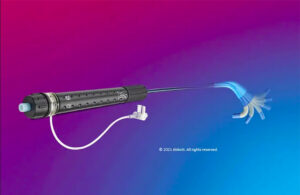
Launched in the U.S. in April 2022, the Amplatzer sheath delivers Abbott’s Amplatzer Amulet left atrial appendage occluder. Competing against Boston Scientific’s Watchman, Amplatzer Amulet provides complete occlusion in order to reduce the risk of ischemic stroke among people with atrial fibrillation.
Abbott, in June, initiated a recall of model No. ASDS-14F-075 of the sheath — 672 devices distributed in the U.S. between Oct. 4, 2022, and Feb. 22, 2023 — because there is an increased risk for the introduction of air bubbles (air emboli) into patients who have procedures with this device, according to the FDA.
The company reports 26 incidents, 16 injuries, and no deaths related to this issue.
Abbott is asking health providers to return any remaining unused Amplatzer steerable delivery sheaths. The company says the clinicians should use the fixed curve TorqVue 45°x45° delivery system for future Amplatzer Amulet LAA occluder implants.
In a statement shared with MassDevice, the company said:
Abbott has recalled one of the delivery systems used to implant the Amplatzer Amulet left atrial appendage (LAA) occluder after receiving a small number of reports of air entering the delivery system. The company has communicated this to physicians and regulatory bodies and is working with hospitals to return any unused Amplatzer steerable delivery sheaths. Importantly, the recall of the delivery system does not impact the Amplatzer Amulet LAA occluder device, and physicians can continue to use the Amplatzer TorqVue™ 45°x45° delivery sheath for future procedures.
Just five months ago, the company released data from its Amulet IDE trial, its largest LAA occlusion study to date with more than 1,800 patients. Findings showed the device with dual-seal technology had fewer unresolved, severe peri-device leaks (PDLs) compared to Boston Scientific’s previous-generation Watchman device. Dual-seal technology features a lobe or piece to fill the LAA cavity and a disc to seal off the opening. PDLs occur when blood leaks around the implant.

